|
|
|
Sort Order |
|
|
|
Items / Page
|
|
|
|
|
|
|
| Srl | Item |
| 1 |
ID:
153762


|
|
|
|
|
| Summary/Abstract |
This article investigates the efforts made to protect prisoners of war (POWs) in German hands at the end of the Second World War. Challenging contemporary and historical judgments, it argues that Allied plans were reasonable, realistic, and reflected a widespread belief in the importance of protecting the lives and well-being of Allied POWs. Although only two operations were ultimately mounted, the process of raising and equipping specialized recovery units provided a valuable learning experience for Allied planners, which later went on inform recovery operations in the Pacific, and set a precedent that arguably extends to influence attitudes towards POW recovery today.
|
|
|
|
|
|
|
|
|
|
|
|
|
|
|
|
| 2 |
ID:
153759
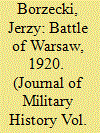

|
|
|
|
|
| Summary/Abstract |
The Battle of Warsaw decided the outcome of the Polish-Soviet War of 1919–1920. The Red Army suffered what Lenin called a “catastrophic” and “unheard-of defeat.” Historians have often found it difficult to explain the astonishing Polish victory—the “Miracle on the Vistula.” The latest English-language literature on the topic is confusing. Ian Johnson asserts the battle was won thanks to the cracking of Soviet ciphers by the Polish radio-intelligence service. Adam Zamoyski does not even mention radio-intelligence as a factor. This article resolves the problem by looking at the recent Polish literature on the subject.
|
|
|
|
|
|
|
|
|
|
|
|
|
|
|
|
| 3 |
ID:
153755


|
|
|
|
|
| Summary/Abstract |
Medieval Germany was wracked by civil war throughout the 1060s–1080s. Among our best sources for this conflict is Bruno of Merseburg, whose historical work The Saxon War treats many aspects of the wars between King Henry IV (1056–1106) and his opponents. Unfortunately, neither this text nor the military history of Germany in the eleventh century have received much attention from scholars focusing on the nature and conduct of war. The burden of this study, therefore, is to illuminate Bruno’s treatment of military matters, and consider how his work can be used to understand warfare in eleventh-century Germany.
|
|
|
|
|
|
|
|
|
|
|
|
|
|
|
|
| 4 |
ID:
153758
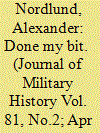

|
|
|
|
|
| Summary/Abstract |
British soldiers greeted the Armistice on 11 November 1918 with mixed reactions, according to their various personal testimonies from the First World War. By integrating studies of how soldiers understood the war in 1918 with their reactions to and later remembrances of the Armistice, this study argues that an explanation for such mixed attitudes can be traced to the experience of combat in 1918 rather than a general sense of disillusionment with the war itself. In the end, soldiers mixed triumph and tragedy into the idea of having “done my bit” to articulate a positive interpretation of the conflict.
|
|
|
|
|
|
|
|
|
|
|
|
|
|
|
|
| 5 |
ID:
153769
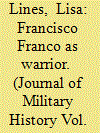

|
|
|
|
|
| Summary/Abstract |
Although he was the military leader of the winning Nationalist side during the Spanish Civil War, Francisco Franco’s place in history has been largely defined by his subsequent long-term political role as head of the Spanish fascist state. Up to now, those historians who have assessed his military acumen have tended to give him low marks, particularly on the grounds that his poor grasp of strategy and tactics unnecessarily prolonged the Civil War and led to an inordinately high number of casualties. Recently, however, some historians have begun to reconsider Franco’s skills as a military leader, by viewing his performance within the context of his own cultural and political environment, rather than that of a later era or of other national military traditions.
|
|
|
|
|
|
|
|
|
|
|
|
|
|
|
|
| 6 |
ID:
153766
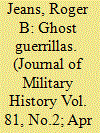

|
|
|
|
|
| Summary/Abstract |
After a protracted struggle, in 1949 the Chinese Communists defeated Chiang Kai-shek’s Nationalist armies and took control of the mainland. After the possibility of recognition of the new regime was dashed by Communist mistreatment of American diplomats and other U.S. citizens, the U.S. government adopted a strong anticommunist position. Disgusted with Chiang and his Chinese Nationalist Party, it also turned its back on its wartime ally. Thus opposed to both Communists and Nationalists even before the final Communist victory, it launched a search for viable “third forces” (neither Communist nor Nationalist) it could support instead. Far from an “abstraction,” this quest constituted a powerful theme in the approaches of the Central Intelligence Agency (CIA) and State Department to China during the early 1950s.
|
|
|
|
|
|
|
|
|
|
|
|
|
|
|
|
| 7 |
ID:
153757
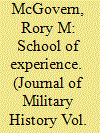

|
|
|
|
|
| Summary/Abstract |
At the end of a distinguished career, George W. Goethals completed the construction of the Panama Canal (1907–1914) and managed logistics for the U.S. Army in the final year of World War I. This article examines Goethals’s professional development prior to his arrival in Panama in 1907. It finds that Goethals was a product of an unsystematic developmental model that privileged experiential learning above all else, and that his successful development was more a function of talent, personal connections, and chance than of institutional design or formal training and education.
|
|
|
|
|
|
|
|
|
|
|
|
|
|
|
|
| 8 |
ID:
153756
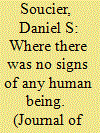

|
|
|
|
|
| Summary/Abstract |
Benedict Arnold’s expedition through the wilds of Maine in 1775 during the American Revolution is typically discussed in two common tropes: the praise for Arnold’s leadership and bravery to overcome insurmountable odds, and the privation and suffering experienced by the soldiers in the face of the howling wilderness. This article complicates this narrative by examining how soldiers examine, interact with, impose order over, and find pleasure in the natural world. It argues that all soldiers have complex ideas about the environments in which they serve and that quite often—despite intense privation—they feel fear, consternation, intrigue, invigoration, and awe.
|
|
|
|
|
|
|
|
|
|
|
|
|
|
|
|
|
|
|
|
|